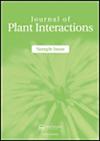五种埃及黄颡鱼基因型耐旱性的表型、生理和分子评估
IF 3.3
3区 生物学
Q2 PLANT SCIENCES
引用次数: 3
摘要
长期干旱给农业部门带来了严峻的挑战。本研究主要研究了5种大刍草(Zea mexicana Schrad L.)基因型(Ba、Gm1、Gm2、Gm3和Gm4)的表型、生理和分子反应。在两季(2020年和2021年)的田间试验中,15日龄大刍草分别进行了充足水分(15天浇灌频率)、中度干旱(25天浇灌频率)和极端干旱(35天浇灌频率)处理作为对照。干旱对所有基因型的生长、产量、叶绿素和POD活性都有负面影响,但促进了可溶性糖和蛋白质、渗透调节分子(甘氨酸、氨基酸和脯氨酸)、非酶抗氧化剂(酚类、黄酮类和生物碱)和SOD活性。此外,长期水分胁迫上调了MOCOS、Rad17、NCED1、CAT1和P5CS基因的表达,其中Gm3和Gm4是最耐旱的基因型。这些发现可以用于培育耐受性基因型的育种项目,以应对干旱等气候变化带来的挑战。本文章由计算机程序翻译,如有差异,请以英文原文为准。
Phenotypical, physiological and molecular assessment of drought tolerance of five Egyptian teosinte genotypes
ABSTRACT Prolonged drought presents a serious challenge to the agricultural sector. The main concern of this work was to assess the phenotypical, physiological, and molecular responses of five teosinte (Zea mexicana Schrad L.) genotypes (Ba, Gm1, Gm2, Gm3 and Gm4). In a two-season (2020 and 2021) field experiment, fifteen-day-old teosinte plants were subjected to well-watered (15-day watering frequency) as a control, moderate drought (25-day watering frequency), and extreme drought (35-day watering frequency) treatments. Drought negatively affected growth, yield, chlorophyll, and POD activity of all genotypes, but promoted soluble sugars and proteins, osmoregulatory molecules (glycinebetaine, amino acids, and proline), non-enzymatic antioxidants (phenols, flavonoids, and alkaloids), and SOD activity. Furthermore, long-term water stress upregulated MOCOS, Rad17, NCED1, CAT1, and P5CS genes expression, with Gm3 and Gm4 being the most drought-tolerant genotypes. These findings could be employed in breeding programs to develop tolerant genotypes to address the challenges posed by climate changes like drought.
求助全文
通过发布文献求助,成功后即可免费获取论文全文。
去求助
来源期刊

Journal of Plant Interactions
PLANT SCIENCES-
CiteScore
5.30
自引率
6.20%
发文量
69
审稿时长
>12 weeks
期刊介绍:
Journal of Plant Interactions aims to represent a common platform for those scientists interested in publishing and reading research articles in the field of plant interactions and will cover most plant interactions with the surrounding environment.
 求助内容:
求助内容: 应助结果提醒方式:
应助结果提醒方式:


